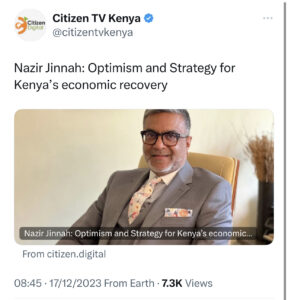Until October 2022, Nazir Bhaduralli NurMohammad Jinnah was hiding in plain sight masquerading as a high end lawyer. It was the English Point Marina scandal in 2022 that blew his cover and brought him to the public spotlight.
KCB Group had seized the Mombasa’s luxury property English Point Marina and placed Pearl Beach Hotels, the real estate firm that owns it, under statutory management over a Sh5.2 billion debt. Pearl Beach Hotels had been struggling to meet its obligations to the bank over the years forcing KCB to place it under administration in June 2022.
Mr. Nazir is the Director of Pearl Beach Hotels.
Kenya’s Swindler ‘Lawyer’
It came to surface that he was minting millions from unsuspecting Kenyans and investors posing as distinguished lawyer with reputable law firms, in fact, he acted as the legal director in the KCB case which blew his cover.
For at least a decade, Nazir made millions in legal fees. Armed with a professional profile that would cow most lawyers across the globe, he managed to net clients who believed that he is one of the best advocates in Kenya. From work stints with top law firms including Khaminwa & Khaminwa Advocates and MMC-Asafo, Conrad Law & Consultancy in Nairobi to Piper May Solicitors in the UK and Mussolini & Dessel in the US, Jinnah’s claimed experience made him appear a cut above the rest.
Not even the most senior advocates at the law firm Conrad Law & Consultancy, where Jinnah worked, could match his profile. He was in ozone layer and hot as corona.
In the same year, Mr. Nazir was subjected to impersonation investigations by the Directorate of Criminal Investigations (DCI) who did not only find that he was practicing without certification but that he had minted millions from many.
He was charged eventually for posing as an associate of a reputable law firm in Kenya in a divorce case that had required him to travel to London as a lead counsel.
Nazir was charged that between the year 2013 and 2017 in Nairobi with intent to defraud Herbas Singh Birdi falsely presented himself to be an advocate of the High Court of Kenya as an associate of Khaminwa and Khaminwa advocates.
Nazir Jailed
Yesterday, he was sentenced to serve 18 months for presenting himself as an advocate .
The businessman was given an alternative of paying a fine each of Sh250,000.
Milimani Senior Principal Magistrate Dolphina Alego found him guilty of presenting himself as an advocate of the High Court of Kenya.
He was also found guilty of making a document without authority and uttering false document.
“Conclusively, this court finds that the prosecution has proved their case in all the charges beyond reasonable doubt and this court finds that accused person is guilty herein and court convict accordingly,” ruled the court.
The charge sheet stated that with intent to defraud and without lawful authority, he made a letter for sale of property LR. No. (4/171-Nyari-Nairobi addressed to Singh purporting it to be genuine letter written and issued by Senior Counsel Khaminwa law firm.
During the hearing Law Society of Kenya categorically confirmed to the court Nazir was not an advocate or it member.
Sonny Birdi who was the first witness in the case told the court that he met Nazir in 2013 who was known to his father and was a consultant with Khaminwa advocates. That he was going through his divorce in the United Kingdom.
He needed help and that the accused now convict would be the lead counsel in Kenya. He testified that he had a UK solicitor.
He wrote a letter of appointment to the UK solicitor as lead counsel for the case. The case was in the UK and he paid for him to travel to UK.
Accused traveled to the UK twice.
Court heard that Nazir traveled to Canada for over six months and that his father went to khaminwa advocates to follow up on his land case and that is when he learnt Nazir has never been their employee, agent or partner.
In his defense, he denied receiving Sh5, 540,000 from Agwawal Khan and Company and that he has no idea wherethe money went to.
Retired engineer Sunny Birdi in his testimony told the court the last payment of the sale of his land assets of Farhana Properties limited in Mombasa was paid to Nazir.
The convict also denied presenting himself as an advocate at Khaminwa law firm.
Digital transformation of Nazir
As soon as he had been exposed and became a subject of controversy, Nazir went back to the drawing board and came up with a campaign strategy to counter his negative press image. He retained services of PR firm to cleanse his dirty image, Kenya Insights has learned.
In nearly similar strategy, Nazir has been planting PR articles in major publications in Kenya and in which he keeps switching his roles in his op-eds from being an investor, climate change activist, lifestyle, road safety expert, to reverting to negative stereotype and being a problem facing Pinewood resort in internal problems from within the Kanji family beginning with English Point Marina up to the recent attack at the hotel.
It’s ridiculous that Mr. Nazir has been trying so hard to counter the negative stories of him being a fake lawyer by posing as a man of questionable characters, if this was a movie, the Netflix’s own ‘Twitter Swindler’ would come close to describing it.
This is just but a sample of many faces that Nazir has put up in planted articles across the mainstream media and yet again trying to paint himself as a man cut above the rest. This is likely aimed at building his portfolio of whatever he’s looking at.
How to become a lawyer in Kenya
In order for one to become a certified lawyer in Kenya, one has to acquire an education from an institution recognized by the Council of Legal Education in Kenya.
This takes four years after which they graduate with a Bachelor’s degree in law, then attend the Kenya School of Law for two years.
At the Kenya School of Law, one undergoes an advocates training program which is conducted for one year in-house after which one moves to pupillage which is a 12-month training period for those aiming to qualify as barristers (a person called to the bar and entitled to practice as an advocate, particularly in the higher courts), usually spent in a barristers’ chambers.
Through the LSK search engine, a website that publishes information regarding the status of its members – one can confirm the authenticity of his/her potential lawyer before making a further move. The website lists lawyers who are dormant or inactive (not certified to practice), suspended or struck off the Roll of Advocates and therefore not allowed to practice and those who are active and certified to practice at that period.
Here a list of Dos and Don’ts when engaging a lawyer in Kenya:
- Do the due diligence and ask the necessary questions – Every advocate licensed to practice in Kenya is issued with a practicing certificate by the Law Society of Kenya. As a starting point, when dealing with a lawyer you’ve never dealt with before, always ask for a copy of their practicing certificate. Go a step further because practicing certificates can be forged. The Law Society of Kenya maintains a search engine where you can search for an Advocate by name or admission number. You can access the same here. As an added measure you can also ask for a law firm’s professional indemnity cover and registration documents as well as recommendations from former clients. DO NOT trust a person on the basis of offices, a name plaque and well made suits.
- Get a retainer or engagement letter signed – once you are satisfied that a lawyer is a qualified advocate, ensure that there is an agreement in writing capturing key points such as:
- The scope of work the advocate is to do for you – this makes it clear what the instructions are so that if the advocate goes beyond the agreed instructions, you can have recourse; and
- The agreed fees, whether a lump sum or hourly rates – this prevents a client from being lumped up with unverifiable fees and costs.
DO NOT deposit any funds or hand over custody of sensitive documents before you do the due diligence and sign an engagement letter.
- Get everything in writing – when sending original title documents such as certificates of title to land or shares or other assets, always ensure that the firm’s receipt of those documents is acknowledged in writing and the reason for the firm’s custody of those documents is well documented. Remember verbal contracts are not worth the paper they are written on!
Kenya Insights allows guest blogging, if you want to be published on Kenya’s most authoritative and accurate blog, have an expose, news TIPS, story angles, human interest stories, drop us an email on [email protected] or via Telegram
Share via:









